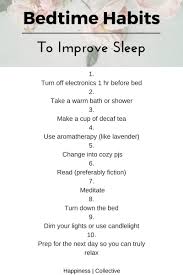The Importance of Good Habits for Better Sleep
Sleep is essential for our overall health and well-being. It plays a crucial role in physical and mental recovery, cognitive function, mood regulation, and immune system support. Developing good sleep habits can significantly improve the quality of your sleep and contribute to a healthier lifestyle.
Here are some recommended habits for better sleep:
- Establish a Consistent Sleep Schedule: Try to go to bed and wake up at the same time every day, even on weekends. This helps regulate your body’s internal clock and improve the quality of your sleep.
- Create a Relaxing Bedtime Routine: Develop a calming routine before bed to signal to your body that it’s time to wind down. This could include reading a book, taking a warm bath, or practicing relaxation techniques like deep breathing or meditation.
- Avoid Stimulants Before Bed: Limit your intake of caffeine, nicotine, and alcohol close to bedtime as they can disrupt your sleep cycle and reduce the quality of your rest.
- Create a Comfortable Sleep Environment: Make sure your bedroom is conducive to sleep by keeping it cool, dark, and quiet. Invest in a comfortable mattress and pillows that support good posture while you sleep.
- Avoid Screens Before Bed: The blue light emitted by screens can interfere with your body’s production of melatonin, a hormone that regulates sleep. Try to avoid screens such as phones, tablets, and computers at least an hour before bedtime.
- Exercise Regularly: Engaging in regular physical activity can improve the quality of your sleep. Aim for at least 30 minutes of moderate exercise most days of the week but avoid vigorous exercise close to bedtime.
- Mind Your Diet: Avoid heavy meals close to bedtime as they can cause discomfort and disrupt your sleep. Opt for light snacks if you’re hungry before bed and consider foods that promote relaxation like herbal tea or warm milk.
By incorporating these good habits into your daily routine, you can create an environment that promotes better sleep quality and overall well-being. Remember that everyone is different, so it may take some trial and error to find the habits that work best for you. Prioritize good sleep hygiene for improved health and vitality!
5 Essential Tips for Developing Better Sleep Habits
- Establish a consistent sleep schedule by going to bed and waking up at the same time every day, even on weekends.
- Create a relaxing bedtime routine to signal to your body that it’s time to wind down, such as reading a book or taking a warm bath.
- Make your bedroom conducive to sleep by keeping it dark, cool, and quiet. Consider using earplugs or an eye mask if needed.
- Limit exposure to screens (phones, tablets, computers) before bedtime as the blue light can disrupt your body’s natural sleep-wake cycle.
- Avoid heavy meals, caffeine, and alcohol close to bedtime as they can interfere with your ability to fall asleep and stay asleep.
Establish a consistent sleep schedule by going to bed and waking up at the same time every day, even on weekends.
Establishing a consistent sleep schedule by going to bed and waking up at the same time every day, including weekends, is a crucial habit for better sleep. This routine helps regulate our body’s internal clock, known as the circadian rhythm, which plays a key role in determining when we feel sleepy and when we feel awake. By maintaining a regular sleep schedule, we can improve the quality of our sleep by ensuring that our bodies are prepared for rest at the same time each night and wakefulness at the same time each morning. This consistency helps promote a more restful and rejuvenating sleep experience overall.
Create a relaxing bedtime routine to signal to your body that it’s time to wind down, such as reading a book or taking a warm bath.
Creating a relaxing bedtime routine is a key habit for better sleep. By engaging in calming activities like reading a book or taking a warm bath before bed, you signal to your body that it’s time to wind down and prepare for rest. These soothing rituals help reduce stress and anxiety, allowing your mind and body to relax and transition smoothly into sleep mode. Establishing a consistent bedtime routine can improve the quality of your sleep and promote a sense of relaxation and well-being.
Make your bedroom conducive to sleep by keeping it dark, cool, and quiet. Consider using earplugs or an eye mask if needed.
To improve the quality of your sleep, it’s essential to create an environment in your bedroom that promotes relaxation and restfulness. Keep your bedroom dark, cool, and quiet to signal to your body that it’s time to unwind and prepare for sleep. If external noise or light is a concern, consider using earplugs or an eye mask to block out distractions and create a more conducive sleeping environment. By prioritizing these elements in your bedroom, you can enhance your ability to fall asleep easily and enjoy a more restful night’s rest.
Limit exposure to screens (phones, tablets, computers) before bedtime as the blue light can disrupt your body’s natural sleep-wake cycle.
Limiting exposure to screens, such as phones, tablets, and computers before bedtime is crucial for better sleep quality. The blue light emitted by these devices can interfere with the body’s natural production of melatonin, the hormone responsible for regulating our sleep-wake cycle. By reducing screen time before bed, you can help your body transition into a more restful state and improve your ability to fall asleep and stay asleep throughout the night.
Avoid heavy meals, caffeine, and alcohol close to bedtime as they can interfere with your ability to fall asleep and stay asleep.
Avoiding heavy meals, caffeine, and alcohol close to bedtime is crucial for promoting better sleep quality. These substances can significantly impact your ability to both fall asleep and stay asleep throughout the night. Heavy meals can cause discomfort and indigestion, making it harder to relax and drift off to sleep. Caffeine is a stimulant that can disrupt your natural sleep-wake cycle, leading to difficulty falling asleep and decreased sleep duration. Alcohol may initially make you feel drowsy but can disrupt the quality of your sleep by interfering with REM cycles, resulting in fragmented and less restorative rest. By steering clear of these substances before bedtime, you can create an optimal environment for a peaceful night’s rest and wake up feeling refreshed and rejuvenated.




